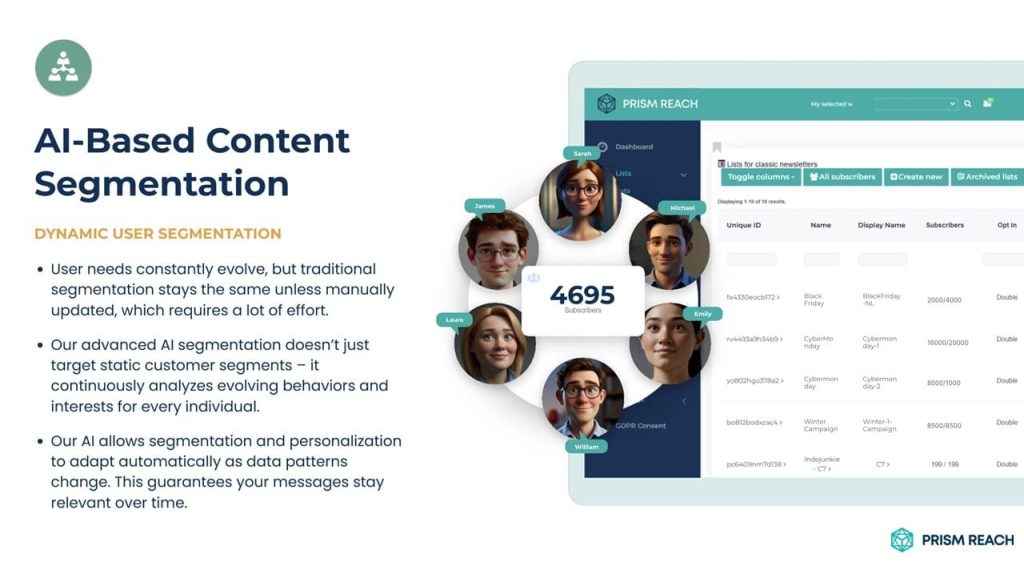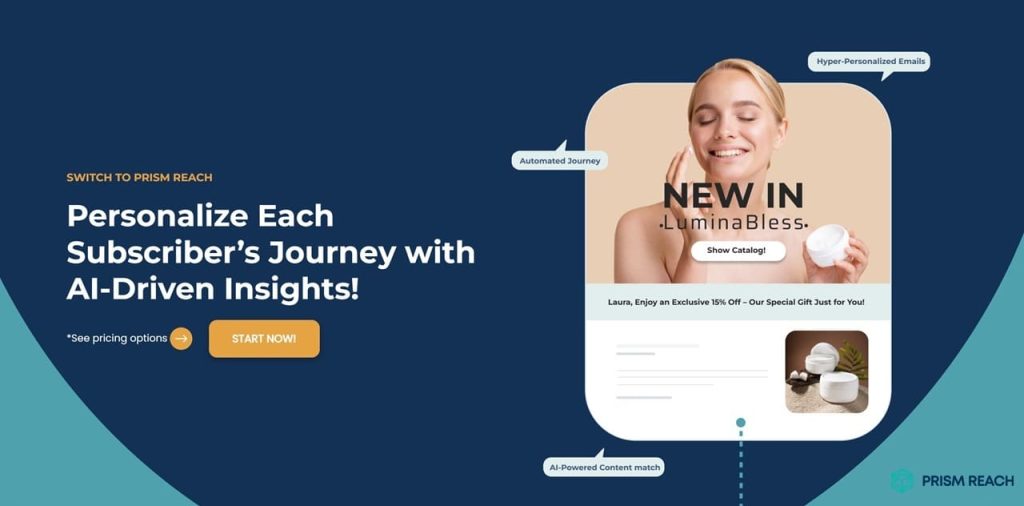In today’s globalized and interconnected world, diversity has become a crucial factor in shaping marketing strategies and product customization. Embracing diversity not only fosters inclusivity but also drives innovation, enhances brand loyalty, and expands market reach. As businesses strive to cater to a multicultural audience, understanding the profound impact of diversity on marketing and product customization is essential for sustainable growth. This comprehensive guide explores how diversity influences marketing effectiveness, unveils hidden gem strategies to leverage diversity, and highlights how Prism Reach, an innovative AI-powered SaaS solution, can enhance your diversity-driven marketing efforts.
Key Facts and Statistics
Understanding the significance of diversity in marketing and product customization is supported by compelling statistics:
- Customer Loyalty: Inclusive brands see a 20% increase in customer loyalty.
- Market Reach: Companies embracing diversity can tap into markets that represent up to 60% of global consumers.
- Innovation: Diverse teams are 35% more likely to outperform their peers in innovation.
- Brand Perception: 70% of consumers feel more positively about brands that promote diversity and inclusion.
- Revenue Growth: Businesses with diverse management teams have seen revenue increases of up to 19%.

Understanding Diversity in Marketing and Product Customization
Diversity in marketing and product customization involves recognizing and addressing the varied needs, preferences, and cultural nuances of a heterogeneous customer base. This approach not only ensures broader audience engagement but also fosters deeper connections and loyalty among diverse consumer groups.
Impact of Diverse Teams
Diverse marketing teams bring a wealth of perspectives and experiences that drive creativity and innovation. This diversity of thought leads to more effective and resonant marketing campaigns that appeal to a wider audience.
- Broader Perspective: Diverse teams consider a wider range of ideas and solutions.
- Enhanced Creativity: Varied backgrounds foster innovative thinking and unique campaign concepts.
- Better Problem Solving: Diverse teams can approach challenges from multiple angles, leading to more effective resolutions.
Authentic Representation in Campaigns
Authentic representation goes beyond tokenism by genuinely reflecting the diversity of the target audience in marketing materials. This authenticity builds trust and relatability, enhancing brand loyalty.
- Trust Building: Consumers are more likely to trust brands that accurately represent their identities.
- Relatability: Authentic representation makes marketing messages more relatable and impactful.
- Enhanced Engagement: Campaigns that reflect diverse experiences resonate more deeply with audiences.
Inclusive Language and Imagery
Using inclusive language and imagery ensures that marketing materials are accessible and welcoming to all individuals, regardless of their background or identity.
- Fostering Inclusion: Inclusive language makes all customers feel valued and respected.
- Avoiding Stereotypes: Thoughtful imagery prevents the perpetuation of harmful stereotypes.
- Broadening Appeal: Inclusive content appeals to a wider range of consumers, enhancing market reach.
Upgrade Your Email Marketing with AI Personalization!
Comparison: How Has Diversity Impacted the Marketing and Customization of Products?
1. Diversity in Marketing and Product Development
- Advantages:
- Broader Audience Reach: Connects with various demographic segments, expanding market potential.
- Enhanced Brand Loyalty: Resonates with diverse consumer values, creating stronger connections.
- Innovative Solutions: Diverse teams bring unique ideas that can drive innovation.
- Improved Cultural Sensitivity: Helps avoid stereotypes and builds more thoughtful campaigns.
- Increased Market Share: Taps into multicultural societies for growth.
- Disadvantages:
- Complex Implementation: Balancing diverse needs can be challenging.
- Risk of Inauthenticity: Tokenistic or superficial efforts might damage the brand’s reputation.
2. Offering Customization Options
- Advantages:
- Higher Customer Satisfaction: Tailored products meet individual preferences.
- Enhanced Brand Loyalty: Personalized offerings build trust and repeat business.
- Competitive Advantage: Customization can attract and retain diverse customer bases.
- Improved Product Fit: Better addresses specific cultural or individual requirements.
- Increased Market Penetration: Appeals to niche segments with distinct needs.
- Disadvantages:
- Increased Production Costs: Customization often raises manufacturing or service expenses.
- Complex Supply Chain: Managing varied product options adds operational complexity.
3. Inclusive Advertising
- Advantages:
- Positive Brand Image: Inclusive campaigns enhance public perception and trust.
- Enhanced Relatability: Reflects diverse lifestyles and identities, fostering connection.
- Increased Engagement: More relatable content can attract and hold audience attention.
- Wider Audience Appeal: Inclusive content can resonate with a broader spectrum of consumers.
- Stronger Community Ties: Builds trust and strengthens relationships within diverse communities.
- Disadvantages:
- Risk of Misrepresentation: If not handled carefully, ads might appear culturally insensitive.
- Higher Campaign Costs: Tailoring content for diverse audiences may require additional resources.
4. Diverse Teams
- Advantages:
- Rich Perspectives: Varied backgrounds lead to more innovative and creative solutions.
- Better Problem Solving: Multiple viewpoints enhance decision-making.
- Cultural Competence: Teams are better positioned to understand and serve diverse consumer needs.
- Increased Creativity: A blend of ideas drives more dynamic creative processes.
- Enhanced Market Insights: Diverse teams can offer a better understanding of global markets.
- Disadvantages:
- Potential for Conflict: Differences in opinions may lead to disagreements.
- Communication Barriers: Varied cultural backgrounds can sometimes hinder effective communication.
5. Leveraging Data Analytics for Diversity
- Advantages:
- Targeted Campaigns: Data helps identify diverse consumer preferences for more focused marketing.
- Personalized Marketing: Tailors messages to specific demographic segments.
- Enhanced Consumer Insights: Reveals patterns in diverse behavior that can guide strategy.
- Optimized Marketing Channels: Data-driven insights improve engagement across varied audiences.
- Better Decision Making: Informs strategy with measurable outcomes.
- Disadvantages:
- Privacy Concerns: Collecting and using demographic data raises ethical and privacy issues.
- Data Misinterpretation: Incorrect analysis can lead to misguided strategies.
This comparison illustrates how each strategy contributes to a more inclusive approach in marketing and product development while also highlighting the complexities and potential challenges in implementation. The right balance and thoughtful execution are key to leveraging these strategies effectively for enhanced brand performance.
5 Hidden Gem Strategies to Leverage Diversity in Marketing
Maximizing the impact of diversity in marketing and product customization requires innovative strategies that go beyond conventional approaches. Here are five hidden gem strategies that can significantly enhance your marketing effectiveness:
Conduct Inclusive Market Research
Strategy: Engage in thorough market research that reflects the diverse needs and preferences of your audience, including demographic, psychographic, and cultural insights.
- Effectiveness: High; understanding diverse customer segments leads to more tailored marketing strategies.
- Obscurity: Many companies overlook the depth of research needed to capture the nuances of different demographics.
- Ease of Implementation: Requires investment in research tools and methodologies but is increasingly accessible.
- Uniqueness: Emphasizes a comprehensive understanding of diverse consumer behaviors.
Example: Utilizing Prism Reach’s AI-powered analytics, a fashion retailer conducts inclusive market research to understand the preferences of diverse ethnic groups, enabling the creation of customized product lines that cater to specific cultural styles and trends.
Build a Diverse Marketing Team
Strategy: Assemble a marketing team with members from various backgrounds to encourage a variety of perspectives during campaign development.
- Effectiveness: Diverse teams drive innovation and creativity, leading to more effective marketing campaigns.
- Obscurity: While diversity is discussed, its direct impact on marketing effectiveness is often underestimated.
- Ease of Implementation: Requires commitment from leadership but can be achieved through hiring practices and training.
- Uniqueness: Leverages internal diversity to enhance external messaging.
Example: A tech company diversifies its marketing team by hiring individuals from different cultural backgrounds. This diversity brings unique insights into campaign creation, resulting in advertisements that resonate more effectively with a global audience.

Collaborate with Diverse Influencers
Strategy: Partner with influencers from various backgrounds who can authentically represent your brand and resonate with diverse audiences.
- Effectiveness: Influencer partnerships can significantly extend reach and credibility among targeted demographic groups.
- Obscurity: While influencer marketing is common, the focus on diversity in influencer selection is often overlooked.
- Ease of Implementation: Requires research and relationship-building but can yield high returns on investment.
- Uniqueness: Ensures that brand messages are delivered through trusted voices within communities.
Example: An organic skincare brand collaborates with diverse beauty influencers to create authentic content that highlights the effectiveness of their products for different skin types and tones, thereby increasing brand trust and expanding their customer base.
Implement Accessibility Standards
Strategy: Ensure that all marketing materials are accessible to individuals with disabilities by adhering to established accessibility standards (e.g., WCAG).
- Effectiveness: Accessibility broadens your audience base and demonstrates inclusivity, positively impacting brand perception.
- Obscurity: Accessibility is often an afterthought in marketing strategies despite its importance for inclusivity.
- Ease of Implementation: Requires initial investment in training and resources but pays off in broader reach.
- Uniqueness: Prioritizes inclusivity by ensuring everyone can engage with your content.
Example: A media company uses Prism Reach to ensure all their email marketing campaigns are accessible, including screen reader compatibility and alternative text for images, making their content inclusive for subscribers with visual impairments.
Monitor Social Sentiment
Strategy: Use social listening tools to monitor sentiment around diversity-related topics within your target audience.
- Effectiveness: Understanding social sentiment allows brands to adapt their messaging proactively and avoid missteps.
- Obscurity: Many companies overlook the importance of real-time feedback from social media interactions.
- Ease of Implementation: Requires investment in social listening tools but is manageable for most organizations.
- Uniqueness: Emphasizes responsiveness to audience sentiments as a core component of marketing agility.
Example: A beverage company uses Prism Reach’s social sentiment analysis to gauge consumer reactions to their diverse marketing campaigns, allowing them to fine-tune their strategies in real-time to better align with audience expectations and preferences.

Benefits of Using Prism Reach in Diversity-Driven Marketing
Integrating advanced tools like Prism Reach into your diversity-driven marketing strategies can amplify their effectiveness. Prism Reach offers a suite of features specifically designed to enhance inclusivity, personalization, and engagement across diverse consumer segments. Here are three key benefits of using Prism Reach in diversity-driven marketing:
1. Enhanced Personalization Through AI
Prism Reach utilizes sophisticated AI algorithms to create detailed user avatars based on subscriber behavior and preferences. This level of personalization is crucial for effectively reaching and engaging diverse audiences.
- Tailored Content: AI-driven personalization ensures that each subscriber receives content that is relevant to their unique cultural background, preferences, and interests.
- Behavioral Insights: By analyzing patterns in subscriber behavior, Prism Reach can predict future actions and tailor marketing messages accordingly, increasing the likelihood of positive engagement.
- Cultural Sensitivity: Personalized content respects and reflects the cultural nuances of different demographic groups, fostering a deeper connection with diverse audiences.
Example: A global apparel brand uses Prism Reach to segment its email list based on cultural preferences and purchase history. The AI personalizes each email with culturally relevant product recommendations and messaging, resulting in higher open and conversion rates across diverse markets.
2. Dynamic Content Selection Tailored to Diverse Audiences
Prism Reach’s ability to dynamically select and tailor content based on real-time data ensures that your emails remain relevant and engaging to a diverse audience.
- Real-Time Adaptation: The platform continuously updates content based on the latest subscriber interactions and feedback, keeping your campaigns fresh and responsive to changing preferences.
- Localized Content: Prism Reach can automatically adjust content to align with local cultural events, holidays, and trends, enhancing the relevance of your marketing messages.
- Inclusive Messaging: Dynamic content ensures that marketing messages are inclusive and considerate of diverse perspectives, avoiding one-size-fits-all approaches.
Example: An international food brand leverages Prism Reach to customize its email content based on regional dietary preferences and cultural festivities. During Ramadan, for instance, the platform automatically highlights products and recipes that cater to fasting practices, increasing engagement and sales in Muslim-majority regions.
3. Comprehensive Performance Monitoring for Inclusive Campaigns
Prism Reach provides robust tracking tools to monitor the effectiveness of your email campaigns, ensuring that your diversity-driven strategies are yielding the desired results.
- Demographic Analytics: The platform offers detailed insights into how different demographic segments are interacting with your campaigns, allowing for data-driven adjustments to improve effectiveness.
- Engagement Metrics: Track key performance indicators such as open rates, click-through rates, and conversion rates across diverse groups to identify what resonates most with each segment.
- Feedback Integration: Prism Reach can incorporate direct feedback from subscribers to refine and enhance your marketing strategies continuously, ensuring ongoing alignment with diverse audience needs.
Example: A multinational electronics company uses Prism Reach to analyze engagement metrics from its diverse customer base. The insights reveal that certain product categories perform better with specific demographic groups, allowing the company to tailor future campaigns to highlight these products more prominently within those segments, thereby maximizing relevance and impact.

Practical Tips for Enhancing Diversity in Email Marketing
To effectively enhance diversity in your email marketing efforts, consider the following practical tips. These strategies will help ensure that your campaigns are inclusive, culturally sensitive, and highly engaging for a diverse audience:
1. Personalization Techniques
- Use Subscriber Data to Personalize Content: Leverage demographic and behavioral data to create personalized subject lines and email content that reflect the unique backgrounds and interests of your subscribers.
- Segment Your Audience: Divide your email list into segments based on factors such as ethnicity, gender, age, and cultural preferences. This allows for more targeted and relevant messaging.
- Implement Dynamic Content Blocks: Use dynamic content blocks that adapt to individual subscriber interests, ensuring that each email delivers content that is meaningful and engaging to the recipient.
Example: A global travel agency uses Prism Reach to segment its email list by region and cultural preferences. Personalized emails include travel packages that cater to specific cultural festivals and holidays, increasing relevance and engagement among diverse subscribers.
2. Automation Best Practices
- Set Up Automated Workflows: Create automated email workflows that include welcome series, cultural event greetings, and post-purchase follow-ups tailored to different demographic groups.
- Optimize Send Times: Use predictive analytics to determine the best times to send emails to different segments, considering factors such as time zones and cultural schedules.
- Automate Cross-Selling and Upselling: Develop automated campaigns that recommend products based on customer behavior and preferences, ensuring that recommendations are culturally relevant and personalized.
Example: An online bookstore employs Prism Reach to automate personalized recommendations based on customers’ previous purchases and cultural interests. During Diwali, the system sends automated emails featuring books by authors from South Asian backgrounds, enhancing relevance and boosting sales in that segment.
3. Continuous Improvement and Adaptation
- Analyze Campaign Performance: Regularly review performance metrics across different demographic segments to identify what works and what needs improvement.
- Gather and Integrate Customer Feedback: Use surveys, polls, and direct feedback to understand the preferences and experiences of your diverse audience, and adjust your strategies accordingly.
- Stay Updated with Trends and Technologies: Keep abreast of the latest email marketing trends and technologies that support inclusivity and personalization, ensuring your campaigns remain effective and relevant.
Example: A fitness brand uses Prism Reach to continuously monitor the performance of its diverse email campaigns. Feedback collected through integrated surveys reveals a high demand for workout plans tailored to different cultural practices, prompting the brand to develop and promote culturally specific fitness programs.

Conclusion
Diversity has profoundly impacted the marketing landscape, challenging businesses to adopt more inclusive and culturally sensitive approaches. By embracing diversity in marketing and product customization, brands can forge deeper connections with diverse consumer segments, drive innovation, and unlock new growth opportunities. Implementing hidden gem strategies such as conducting inclusive market research, building a diverse marketing team, collaborating with diverse influencers, implementing accessibility standards, and monitoring social sentiment can significantly enhance your marketing effectiveness.
Integrating advanced tools like Prism Reach further amplifies these strategies by providing enhanced personalization through AI, dynamic content selection tailored to diverse audiences, and comprehensive performance monitoring for inclusive campaigns. Prism Reach empowers businesses to create highly personalized and culturally relevant email marketing experiences that resonate with individual subscribers, leading to higher engagement, loyalty, and revenue growth.
As businesses navigate the complexities of marketing in a diverse world, prioritizing inclusivity and leveraging the right tools and strategies will be key to achieving sustained success. Embrace the power of diversity to create a customer-centric approach that drives engagement, loyalty, and sustained revenue growth.
Sources
- Thrive Agency: Proven Strategies to Increase Customer Lifetime Value
- MXT Automation: Strategies to Maximize Customer Lifetime Value
- Salesforce: Customer Lifetime Value Insights
- LaunchNotes: Strategies to Increase Customer Lifetime Value
- Alida: Tactics for Increasing Customer Lifetime Value